
ai_all_resources
A curated list of Best Artificial Intelligence Resources
Stars: 791
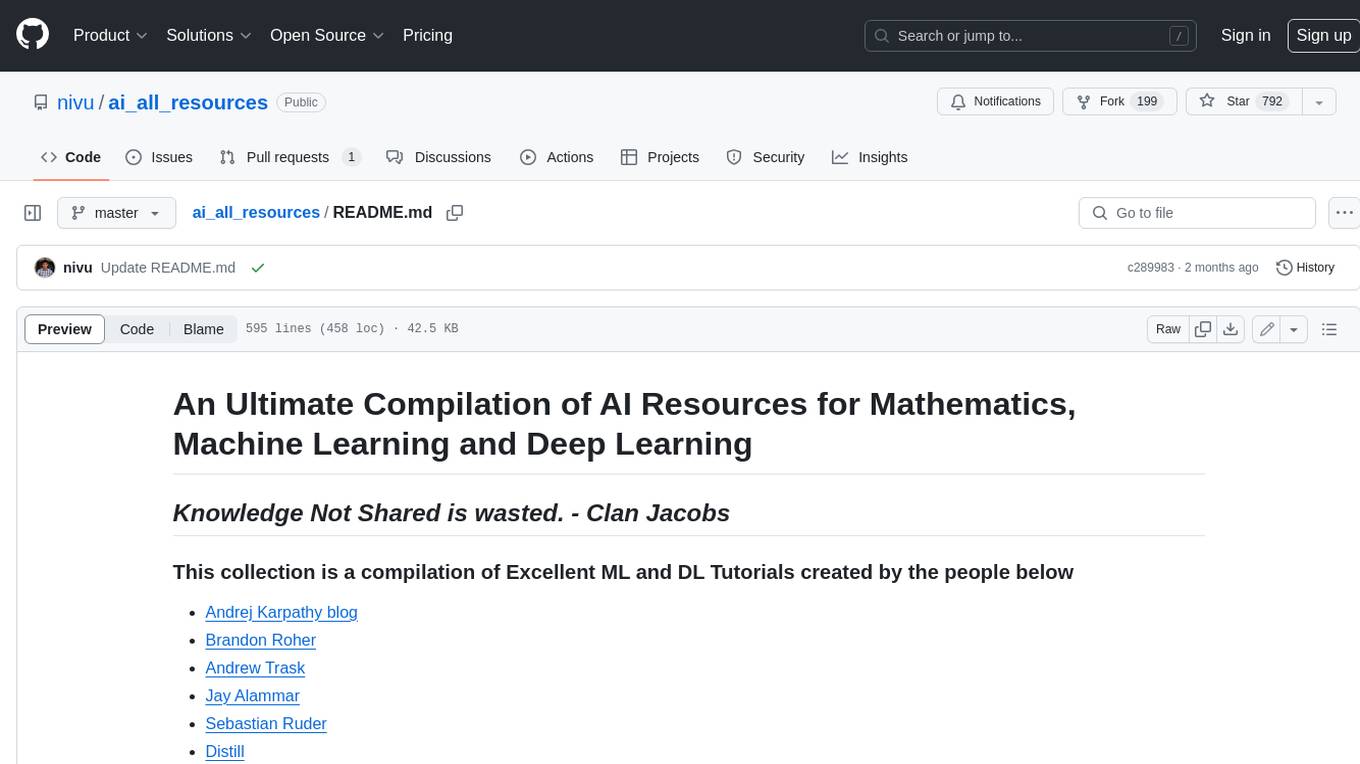
This repository is a compilation of excellent ML and DL tutorials created by various individuals and organizations. It covers a wide range of topics, including machine learning fundamentals, deep learning, computer vision, natural language processing, reinforcement learning, and more. The resources are organized into categories, making it easy to find the information you need. Whether you're a beginner or an experienced practitioner, you're sure to find something valuable in this repository.
README:
- Andrej Karpathy blog
- Brandon Roher
- Andrew Trask
- Jay Alammar
- Sebastian Ruder
- Distill
- StatQuest with Josh Starmer
- sentdex
- Lex Fridman
- 3Blue1Brown
- Alexander Amini
- The Coding Train
- Christopher Olah
- AI Coimbatore Join here🔗⬇️
- TensorFlow User Group Coimbatore
Navaneeth Malingan
- 🖥️ HOW TO GET STARTED WITH MACHINE LEARNING!
- How to Build a Meaningful Career in Data Science
- My Self-Created Artificial Intelligence Masters Degree
- PyImageSearch
- 5 Beginner Friendly Steps to Learn Machine Learning and Data Science with Python
- Luis Serrano: A Friendly Introduction to Machine Learning
- StatQuest: A Gentle Introduction to Machine Learning
- Machine Learning For Everyone Summarize's Machine Learning algorithms and their applications in simple words with real-world examples.
- Teachable Machine Train a computer to recognize your own images, sounds, & poses. A fast, easy way to create machine learning models for your sites, apps, and more – no expertise or coding required.
- Machine Learning by Andrew Ng, Stanford IMDB 10/10 LOL :P
- Datacamp : Data Engineer with Python
- Intro to Machine Learning Topics Covered Naive Bayes, SVM, Decision Trees, Regressions, Outliers, Clustering, Feature Scaling, Text Learning, Feature Selection, PCA, Validation, Evaluation Metrics
- Intro to TensorFlow for Deep Learning The Best Course for Learning TensorFlow
- End-to-End Machine Learning
- NVIDIA DEEP LEARNING INSTITUTE
- Introduction to Machine Learning for Coders!
- Practical Deep Learning for Coders, v3
- FastAI
- CS221 - Artificial Intelligence: Principles and Techniques by Percy Liang and Dorsa Sadigh
- CS229 - Machine Learning by Andrew Ng
- CS230 - Deep Learning by Andrew Ng
- CS231n - Convolutional Neural Networks for Visual Recognition by Fei-Fei Li and Andrej Karpathy
- CS224n - Natural Language Processing with Deep Learning by Christopher Manning
- CS234 - Reinforcement Learning by Emma Brunskill
- CS330 - Deep Multi-task and Meta Learning by Chelsea Finn
- CS25 - Transformers United
- CS/LTI 11-711: Advanced NLP by Graham Neubig
- CS/LTI 11-747: Neural Networks for NLP by Graham Neubig
- CS/LTI 11-737: Multilingual NLP by Graham Neubig
- CS/LTI 11-777: Multimodal Machine Learning by Louis-Philippe Morency
- CS/LTI 11-785: Introduction to Deep Learning by Bhiksha Raj and Rita Singh
- CS/LTI Low Resource NLP Bootcamp 2020 by Graham Neubig
- 6.S191 - Introduction to Deep Learning by Alexander Amini and Ava Amini
- 6.S094 - Deep Learning by Lex Fridman
- 6.S192 - Deep Learning for Art, Aesthetics, and Creativity by Ali Jahanian
- Bias and Variance
- Cross Validation
- Machine Learning Fundamentals: The Confusion Matrix
- Sensitivity and Specivicity
- ROC and AUC, Clearly Explained!
- StatQuest: R-squared explained
- Regularization Part 1: Ridge Regression
- Regularization Part 2: Lasso Regression
- Maximum Likelihood
- Covariance and Correlation Part 1: Covariance
- Statistics Fundamentals: The Mean, Variance and Standard Deviation
- Statistics Fundamentals: Population Parameters
- Glossary: Statistics
- Glossary: Machine Learning
- Looking at R-Squared
- Mathematics for Machine Learning In this post I have compiled great e-resources (MOOC, YouTube Lectures, Books) for learning Mathematics for Machine Learning.
- Mathematics for Machine Learning - Book One great book for all things math for machine learning. (free eBook)
- I highly Recommend you to go through the following resources by 3Blue1Brown
-
Gilbert Strang: Linear Algebra vs Calculus
▶️ -
Basics of Integral Calculus in Tamil
▶️ - New fast.ai course: Computational Linear Algebra
- Linear Algebra Book
-
Python Programming Tutorials by Socratica
▶️ - Python Tutorial by w3schools📙
- Learning Python Programming📙
- A Visual Intro to NumPy and Data Representation
- CS231n : Python Numpy Tutorial
- NumPy resources : part of the End-to-End Machine Learning library
- 100 numpy exercises (with solutions)
- 101 NumPy Exercises for Data Analysis (Python)
- Numpy Tutorial – Introduction to ndarray
- Sci-Py Lectures : NumPy: creating and manipulating numerical data
-
Python NumPy Tutorial for Beginners
▶️ Learn the basics of the NumPy library in this tutorial for beginners. It provides background information on how NumPy works and how it compares to Python's Built-in lists. This video goes through how to write code with NumPy. It starts with the basics of creating arrays and then gets into more advanced stuff. The video covers creating arrays, indexing, math, statistics, reshaping, and more. - Python NumPy Tutorial – Learn NumPy Arrays With Examples
- Python Numpy Array Tutorial
- NumPy Tutorial: Data analysis with Python
-
Deep Learning Prerequisites: The Numpy Stack in Python
▶️
- A Gentle Visual Intro to Data Analysis in Python Using Pandas
-
Data analysis in Python with pandas by Data School
▶️ -
Best practices with pandas by Data School
▶️ - Python Pandas Tutorial: A Complete Introduction for Beginners
-
CodeBasics: Machine Learning Tutorial Python
▶️ -
StatQuest: Machine Learning
▶️ -
sentdex: Machine Learning with Python
▶️ -
Simplilearn: Machine Learning Tutorial Videos
▶️ -
Machine Learning Tutorial in Python
▶️ -
deeplizard: Machine Learning & Deep Learning Fundamentals
▶️
Note: Below you can find the best lectures for popular Machine Learning Algorithms
-
Linear Regression: A friendly introduction by Luis Serrano
▶️ -
Statistics 101: Linear Regression, The Very Basics
▶️ - Regression Line Fitting Playground
- Regression Curve Fitting Playground
-
Linear Regression vs Logistic Regression | Data Science Training | Edureka
▶️ -
Logistic Regression and the Perceptron Algorithm: A friendly introduction by Luis Serrano
▶️
-
StatQuest: Decision Trees
▶️ -
StatQuest: Decision Trees, Part 2 - Feature Selection and Missing Data
▶️ - Decision Tree Introduction with example📙
- Decision Tree📙
- Python | Decision Tree Regression using sklearn📙
- ML | Logistic Regression v/s Decision Tree Classification📙
-
StatQuest: Random Forests Part 1 - Building, Using and Evaluating
▶️ -
StatQuest: Random Forests Part 2: Missing data and clustering
▶️ - Random Forests for Complete Beginners📙
-
Boosting Machine Learning Tutorial | Adaptive Boosting, Gradient Boosting, XGBoost | Edureka
▶️ -
AdaBoost, Clearly Explained
▶️ -
Gradient Boost Part 1: Regression Main Ideas
▶️ -
Gradient Boost Part 2: Regression Details
▶️ -
Gradient Boost Part 3: Classification
▶️ -
Gradient Boost Part 4: Classification Details
▶️ -
XGBoost Part1: XGBoost Trees for Regression
▶️ -
XGBoost Part 2: XGBoost Trees For Classification
▶️ - Ensemble methods Sci-kit learn
-
Support Vector Machines (SVMs): A friendly introduction by Luis Serrano
▶️ -
Support Vector Machines, Clearly Explained!!! by StatQuest
▶️ -
Support Vector Machines Part 2: The Polynomial Kernel by StatQuest
▶️ -
Support Vector Machines Part 3: The Radial (RBF) Kernel by StatQuest
▶️ -
How Support Vector Machines work / How to open a black box
▶️ -
Support Vector Machines - The Math of Intelligence (Week 1)
▶️ - Demystifying Support Vector Machines📙
-
Support Vector Machine (SVM) - Fun and Easy Machine Learning
▶️
-
Bayes theorem, and making probability intuitive
▶️ -
A friendly introduction to Bayes Theorem and Hidden Markov Models
▶️ -
The Bayesian Trap
▶️ -
Naive Bayes classifier: A friendly approach
▶️
-
StatQuest: K-means clustering
▶️ -
Machine Learning Tutorial Python - 13: K Means Clustering
▶️ -
K Means Clustering Algorithm - K Means Example in Python - Machine Learning Algorithms - Edureka
▶️
-
StatQuest: PCA main ideas in only 5 minutes!!!
▶️ -
StatQuest: Principal Component Analysis (PCA), Step-by-Step
▶️ -
Principal Component Analysis (PCA) by Luis Serrano
▶️
- Linear Regression using Gradient Descent📙
-
Gradient Descent, Step-by-Step
▶️ -
Stochastic Gradient Descent, Clearly Explained!!!
▶️ - How Optimization Works A short series on the fundamentals of optimization for machine learning
- Linear Regression using Gradient Descent
- Polynomial Regression
- Gradient Descent in Linear Regression - Math📙
-
Neural Network Backpropagation Basics For Dummies
▶️
-
3.4: Linear Regression with Gradient Descent - Intelligence and Learning
▶️ -
3.5: Mathematics of Gradient Descent - Intelligence and Learning
▶️ -
3.5a: Calculus: Power Rule - Intelligence and Learning
▶️ -
3.5b: Calculus: Chain Rule - Intelligence and Learning
▶️ -
3.5c: Calculus: Partial Derivative - Intelligence and Learning
▶️
- https://datascience.stackexchange.com/questions/24534/does-gradient-descent-always-converge-to-an-optimum
- https://datascience.stackexchange.com/questions/18802/does-mlp-always-find-local-minimum
- https://www.coursera.org/learn/deep-neural-network/lecture/RFANA/the-problem-of-local-optima
- An introduction to machine learning with scikit-learn📙
- Python Machine Learning: Scikit-Learn Tutorial
- DEEP BLUEBERRY BOOK This is a tiny and very focused collection of links about deep learning. If you've always wanted to learn deep learning stuff but don't know where to start, you might have stumbled upon the right place!
- 6.S191: Introduction to Deep Learning (2019)
- MIT 6.S191 Introduction to Deep Learning (2020)
- MIT 6.S191 Introduction to Deep Learning (2023) (YouTube)
- MIT Deep Learning Basics: Introduction and Overview
- MIT Deep Learning by Lex Fridman
- Deep Learning in Tamil
- The Deep Learning Textbook from Ian Goodfellow, Yoshua Bengio, and Aaron Courville
- Neural Networks And Deep Learning by Michael Nielsen
- Grokking Deep Learning by Andrew Trask
-
A friendly introduction to Deep Learning and Neural Networks
▶️ - Machine Learning for Beginners: An Introduction to Neural Networks📙 A simple explanation of how they work and how to implement one from scratch in Python.
- A Visual and Interactive Guide to the Basics of Neural Networks📙
- A Visual And Interactive Look at Basic Neural Network Math📙
-
Neural Network Architectures
▶️ -
Neural Networks Demystified by Welch Labs
▶️ -
Neural networks Series by 3Blue1Brows
▶️
- CS131 Computer Vision: Foundations and Applications Fall 2019
- CS231A: Computer Vision, From 3D Reconstruction to Recognition Winter 2018
- CS231n Convolutional Neural Networks for Visual Recognition
- Computer Vision Notebooks
- CS231n: Convolutional Neural Networks for Visual Recognition Spring 2019
- CS231n: Convolutional Neural Networks for Visual Recognition
- A friendly introduction to Convolutional Neural Networks and Image Recognition
- A Comprehensive Guide to Convolutional Neural Networks — the ELI5 way
- Tensorflow Convolutional Neural Network (CNN)
- Convolutional Networks Book
- CNNs, Part 1: An Introduction to Convolutional Neural Networks
- CS231n Winter 2016 BY Andrej Karpathy 15 Videos
- Intuitive understanding of 1D, 2D, and 3D Convolutions in Convolutional Neural Networks
- CNN ExplainerAn interactive visualization system designed to help non-experts learn about Convolutional Neural Networks (CNNs)
Deep-dive tutorial on Object Detection. Intuition lectures on topics ranging from Classical CV techniques like HOG, SIFT to Convolutional Neural Network based techniques like Overfeat, Faster RCNN etc. You will learn how the ideas have evolved from some of the earliest papers to current ones. And hence the name Evolution of Object Detection Networks.
- SIFT | Scale Invariant Feature Transform
- Hog Intuition | Histogram of Oriented Gradients
- NMS | Non Max Suppression
- Object Localization | Bounding Box Regression
- Object Detection
- RCNN
- Spatial Pyramid Matching | SPM
- SPPNet Object Detection
- Fast RCNN Network
- Faster RCNN
- Yolo v4 Object Detection - How it Works & Why it's So Amazing!
- Frameworks and Libraries
- Labeling Tools
- Code samples
- Announcing the Objectron Dataset | Google AI Blog
- MediaPipe Objectron | Objectron (3D Object Detection)
- A Friendly Introduction to Generative Adversarial Networks (GANs) by Luis Serrano
- Generative Adversarial Networks (GANs) by Ahlad Kumar
- Building our first simple GAN
- Face editing with Generative Adversarial Networks
- Variational Autoencoders
- Generative Adversarial Networks (GANs) in 50 lines of code (PyTorch)
- Generative Models
- CS224n: Natural Language Processing with Deep Learning
- NLP and The Reformer
- The Illustrated Word2vec
- Illustrated Guide to Recurrent Neural Networks: Understanding the Intuition
- Anyone Can Learn To Code an LSTM-RNN in Python (Part 1: RNN) Baby steps to your neural network's first memories.
- The Unreasonable Effectiveness of Recurrent Neural Networks
- An Introduction to Recurrent Neural Networks for Beginners A simple walkthrough of what RNNs are, how they work, and how to build one from scratch in Python.
- Attention and Augmented Recurrent Neural Networks by Distill
- Visualizing memorization in RNNs by Distill Inspecting gradient magnitudes in context can be a powerful tool to see when recurrent units use short-term or long-term contextual understanding.
- Deep Learning for NLP: ANNs, RNNs and LSTMs explained!
- Understanding LSTM Networks
- LSTM implementation explained
- A Gentle Introduction to LSTM Autoencoders
- Part 1 - Position Embeddings
- Part 2 - Multi-Head & Self Attention
- Part 3 - Decoder’s Masked Attention
- NLP Transformers Attention Playlist
- The Illustrated Transformer
- The Annotated Transformer
- Transformers Paper and Code
- Transformers from Scratch
- Transformers Notes
- Transformers, Explained: Understand the Model Behind GPT-3, BERT, and T5
- A comprehensive overview of Transformer variants.
- How to become an NLP & Transformer Model Guru
- [MASTERCLASS] Transformers | Attention Models
- Explaining BERT Simply Using Sketches
- A Visual Guide to Using BERT for the First Time
- The Illustrated BERT, ELMo, and co. (How NLP Cracked Transfer Learning)
- BERT Explained: State of the art language model for NLP
- BioBERT, a language representation model for biomedical domain, especially designed for biomedical text mining tasks such as biomedical named entity recognition, relation extraction, question answering, etc
- Deep Reinforcement Learning Course 🕹️ A Free course in Deep Reinforcement Learning from beginner to expert.
- Implementation of Reinforcement Learning Algorithms. Python, OpenAI Gym, Tensorflow. Exercises and Solutions to accompany Sutton's Book and David Silver's course.
- Unity Machine Learning Agents Toolkit
- 🖥️ WRITING MY FIRST MACHINE LEARNING GAME! (1/4)
- Deep Reinforcement Learning: Pong from Pixels by Andrej Karpathy
- A Beginner's Guide to Deep Reinforcement Learning
- An Introduction to Unity ML-Agents
- Deep Reinforcement Learning Algorithms with PyTorch
- LECTURES: Introduction to Reinforcement Learning - David Silver
- BOOK: Reinforcement Learning - An Introduction by Sutton and Barto
- BOOK: Deep Reinforcement Learning Hands On by Maxim Lapan
- Udacity : Deep Learning with PyTorch
- Deep Learning (PyTorch) : Code
- Udacity : Secure AI
- TORCHSCRIPT
- PyTorchZeroToAll (in English) Sung Kim a Series of 14 Videos
- Introduction to TensorFlow 2.0: Easier for beginners, and more powerful for experts (TF World '19)
- TensorFlow Lite: Solution for running ML on-device (TF World '19)
- Machine Learning in JavaScript (TensorFlow Dev Summit 2018)
- TensorFlow.js Quick Start
- Keras vs. tf.keras: What’s the difference in TensorFlow 2.0?
- How To Run TensorFlow Lite on Raspberry Pi for Object Detection
- How computers learn to recognize objects instantly | Joseph Redmon
- Intro to TensorFlow for Deep Learning
- TensorFlow in Practice Specialization : Coursera
- TensorFlow: Data and Deployment Specialization : Coursera
- Transfer Learning with Keras and Deep Learning
- A Comprehensive Hands-on Guide to Transfer Learning with Real-World Applications in Deep Learning
- TensorFlow Core Tutorials
- Machine Learning in 5 Minutes: How to deploy a ML model (SurveyMonkey Engineer explains)
- Deploy Machine Learning Models with Django
- MlFlow - An open source platform for the machine learning lifecycle
- TensorFlow: Data and Deployment Specialization
- Artificial Intelligence
- Machine Learning
- Deep Learning
- Machine Learning tips and tricks
- Data Science Tools
- Machine Learning with R
- CHRIS ALBON Cheat Sheets and Flash Cards
- MLOps Tooling Landscape v2 (+84 new tools) - Dec '20
- Mathematical tools
- Ordinary Differential Equations for Engineers
- 3Blue1Brown
- StatQuest with Josh Starmer
- Sentdex
- Luis Serrano
- Brandon Rohrer
- deeplizard
- Tech With Tim
- Microsoft Research
- Corey Schafer
- Data School
- Two Minute Papers
- Welch Labs
- Simplilearn
- Great Learning
- DeepLearning.TV
- TensorFlow
- Deeplearning.ai
- Code Bullet
- edureka!
- Lex Fridman
- The Artificial Intelligence Channel
- freeCodeCamp.org
- CloudxLab
- Alexander Amini
- Jeff Heaton
- Abhishek Thakur
- The Coding Train
- 🖥️ HOW TO GET STARTED WITH MACHINE LEARNING!
- My Self-Created Artificial Intelligence Masters Degree
- https://end-to-end-machine-learning.teachable.com/courses/667372/lectures/11900568
- ML Fundamentals by StatQuest
- Machine Learning with Python by sentdex
- 5 Beginner Friendly Steps to Learn Machine Learning and Data Science with Python - Daniel Bourke
- Data School
- Neural Networks and Deep Learning
- https://www.machinelearningisfun.com/
- https://medium.com/@ageitgey/machine-learning-is-fun-80ea3ec3c471
- https://medium.com/greyatom
- https://greyatom.com/glabs
- John Searle: "Consciousness in Artificial Intelligence" | Talks at Google
- https://github.com/nature-of-code/NOC-S17-2-Intelligence-Learning/tree/master/week3-classification-regression
- https://github.com/nature-of-code/NOC-S17-2-Intelligence-Learning
For Tasks:
Click tags to check more tools for each tasksFor Jobs:
Alternative AI tools for ai_all_resources
Similar Open Source Tools

ai_all_resources
This repository is a compilation of excellent ML and DL tutorials created by various individuals and organizations. It covers a wide range of topics, including machine learning fundamentals, deep learning, computer vision, natural language processing, reinforcement learning, and more. The resources are organized into categories, making it easy to find the information you need. Whether you're a beginner or an experienced practitioner, you're sure to find something valuable in this repository.
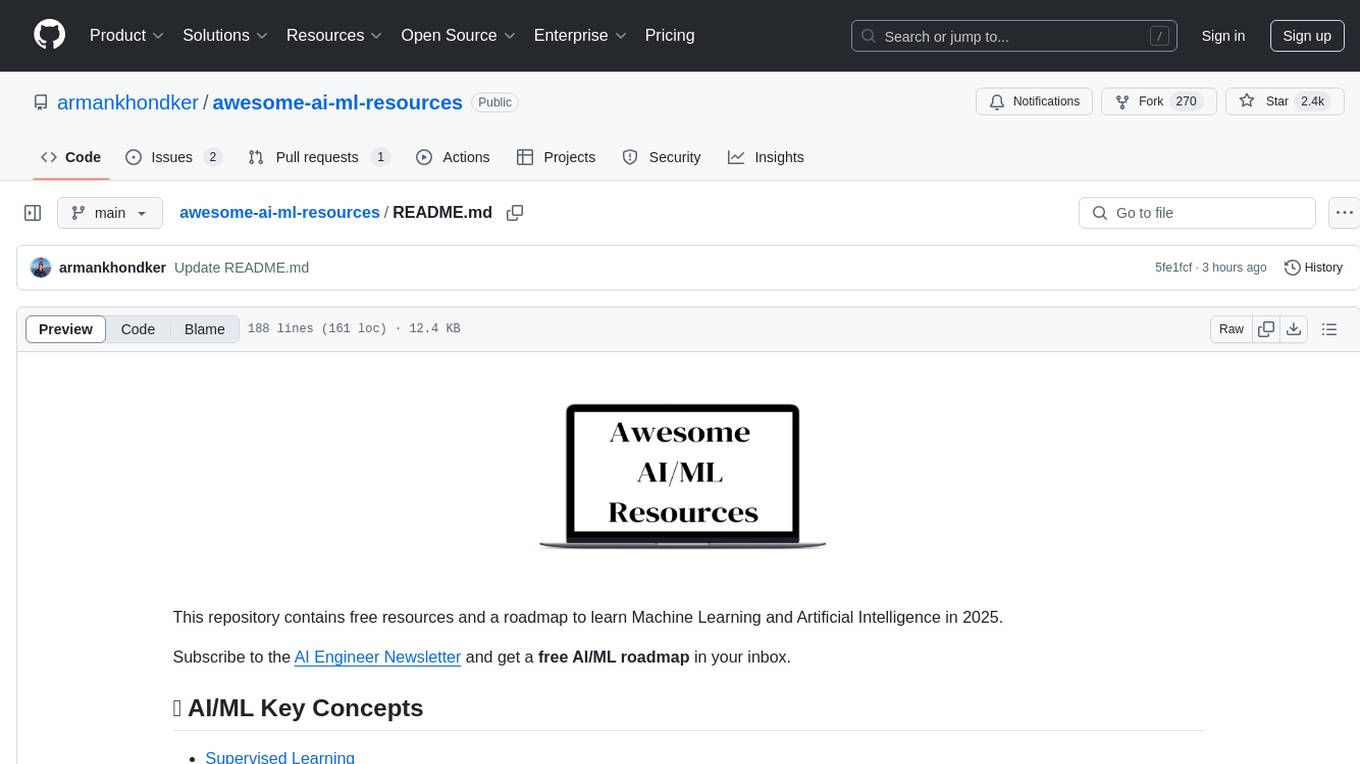
awesome-ai-ml-resources
This repository is a collection of free resources and a roadmap designed to help individuals learn Machine Learning and Artificial Intelligence concepts by providing key concepts, building blocks, roles, a learning roadmap, courses, certifications, books, tools & frameworks, research blogs, applied blogs, practice problems, communities, YouTube channels, newsletters, and must-read papers. It covers a wide range of topics from supervised learning to MLOps, offering guidance on learning paths, practical experience, and job interview preparation.
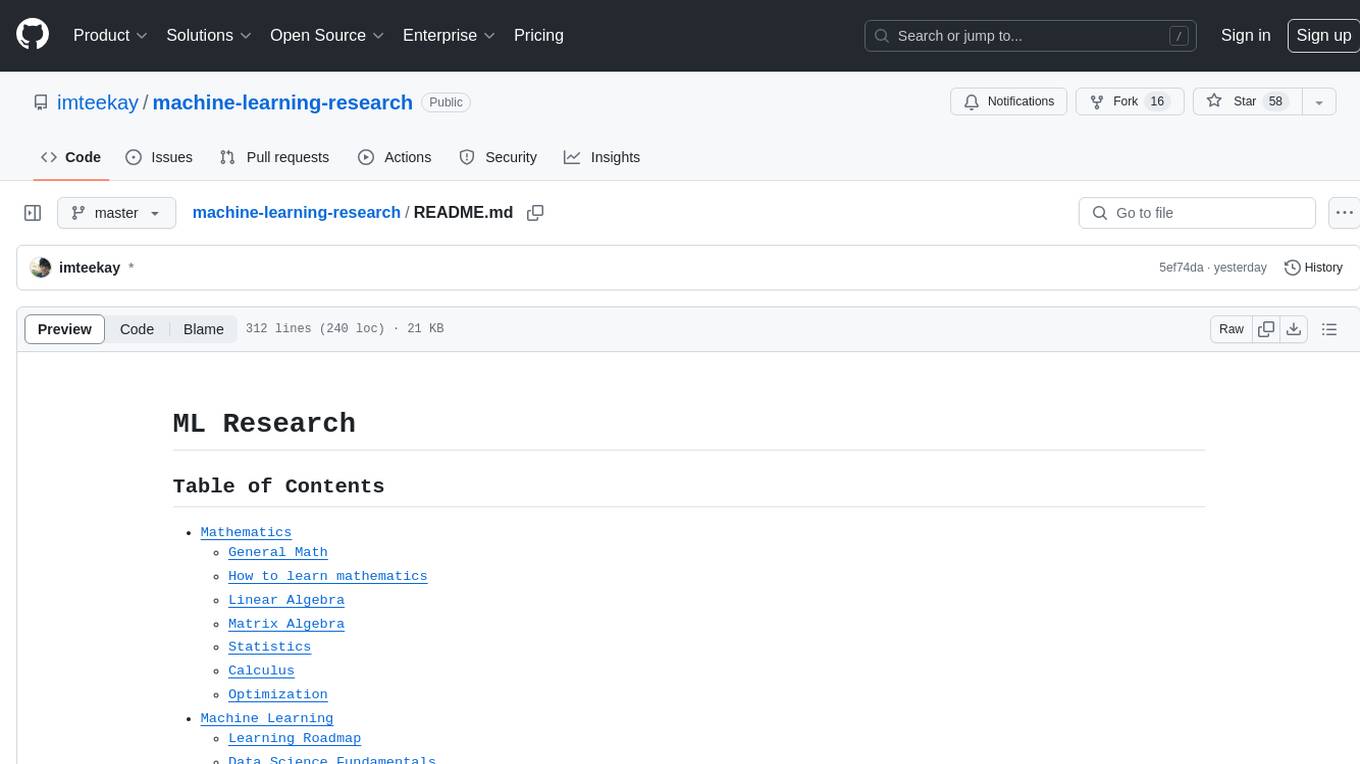
machine-learning-research
The 'machine-learning-research' repository is a comprehensive collection of resources related to mathematics, machine learning, deep learning, artificial intelligence, data science, and various scientific fields. It includes materials such as courses, tutorials, books, podcasts, communities, online courses, papers, and dissertations. The repository covers topics ranging from fundamental math skills to advanced machine learning concepts, with a focus on applications in healthcare, genetics, computational biology, precision health, and AI in science. It serves as a valuable resource for individuals interested in learning and researching in the fields of machine learning and related disciplines.
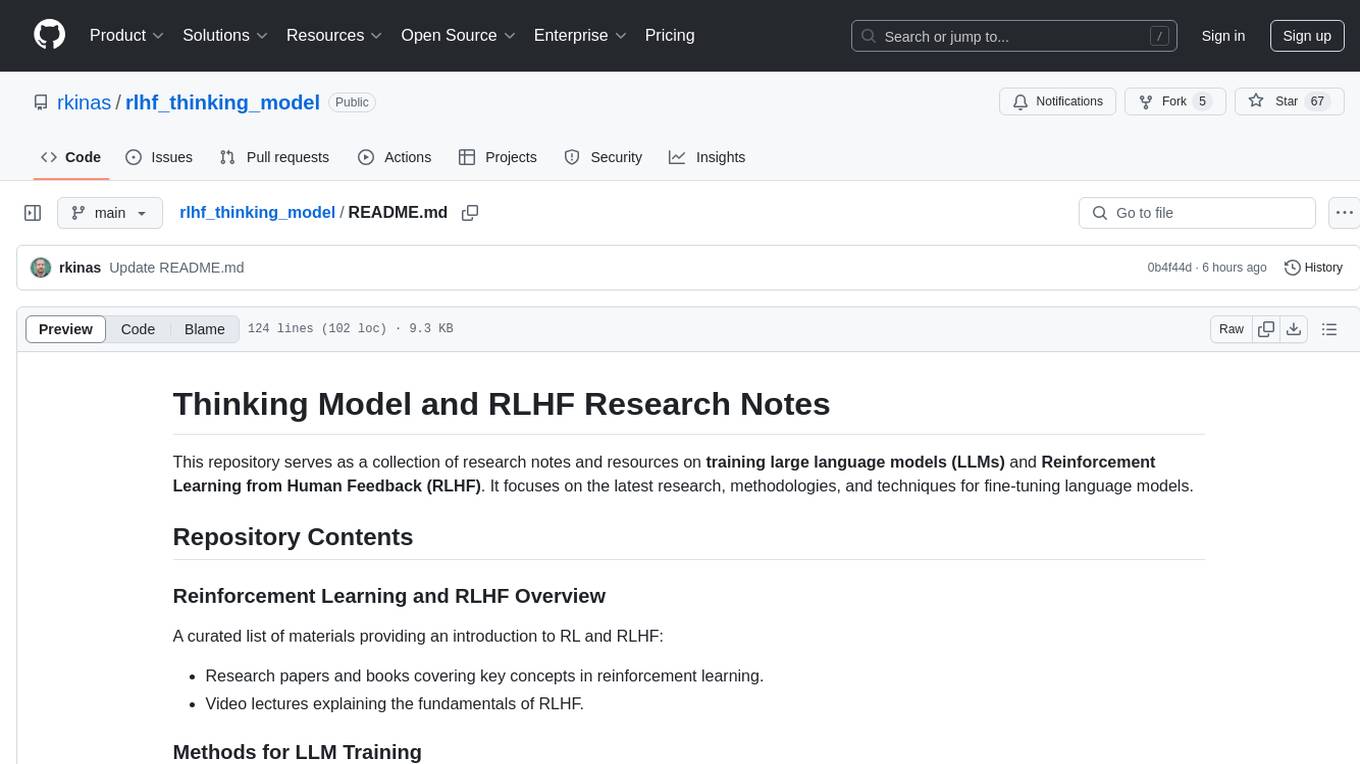
rlhf_thinking_model
This repository is a collection of research notes and resources focusing on training large language models (LLMs) and Reinforcement Learning from Human Feedback (RLHF). It includes methodologies, techniques, and state-of-the-art approaches for optimizing preferences and model alignment in LLM training. The purpose is to serve as a reference for researchers and engineers interested in reinforcement learning, large language models, model alignment, and alternative RL-based methods.
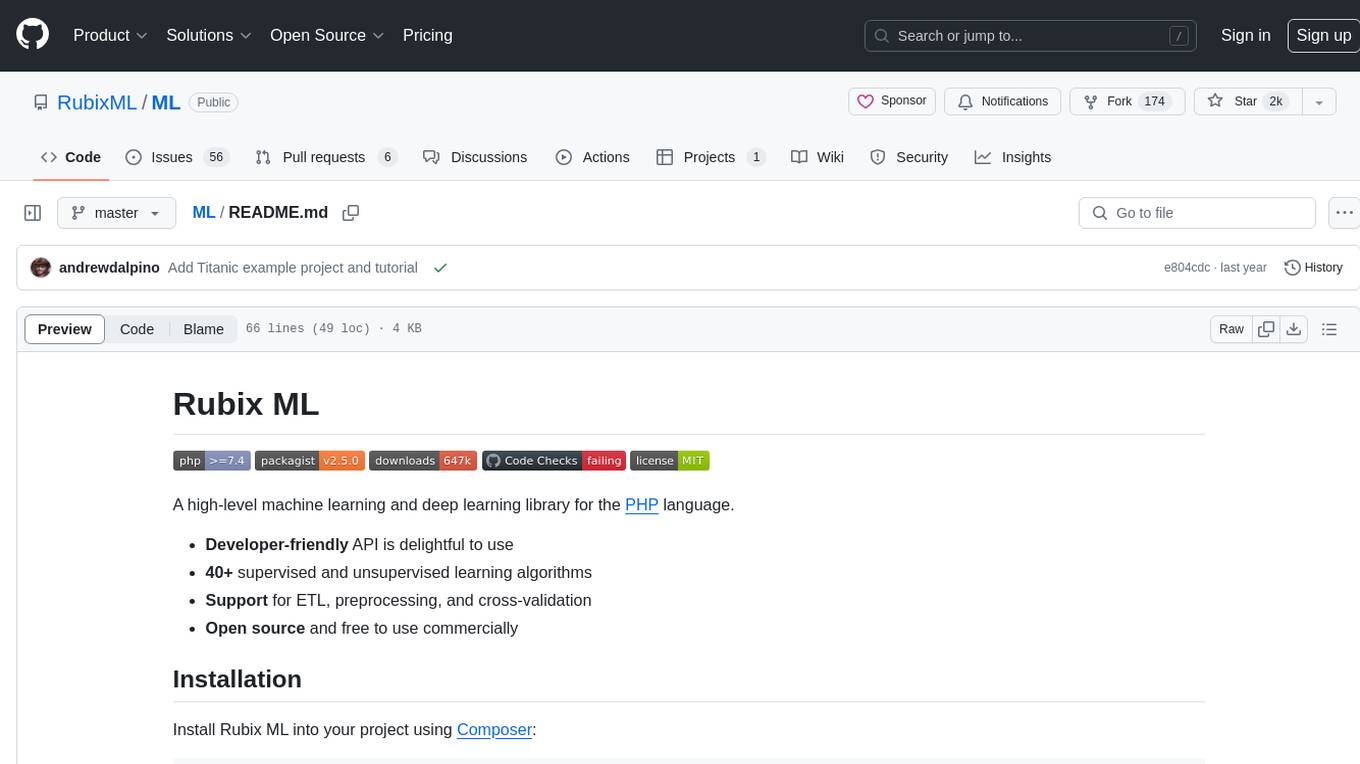
ML
Rubix ML is a high-level machine learning and deep learning library for the PHP language. It provides a developer-friendly API with over 40 supervised and unsupervised learning algorithms, support for ETL, preprocessing, and cross-validation. The library is open source and free to use commercially. Rubix ML allows users to build machine learning programs in PHP, covering the entire machine learning life cycle from data processing to training and production. It also offers tutorials and educational content to help users get started with machine learning projects.
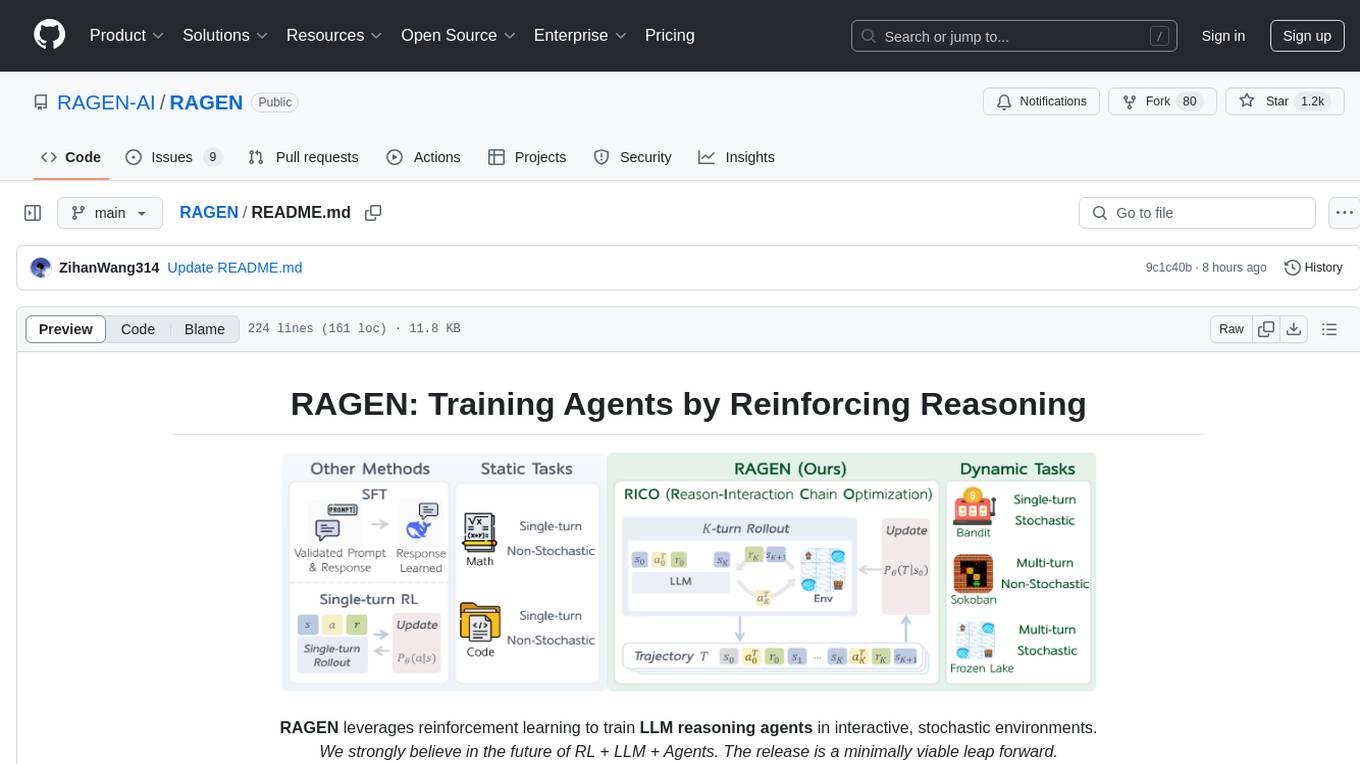
RAGEN
RAGEN is a reinforcement learning framework designed to train reasoning-capable large language model (LLM) agents in interactive, stochastic environments. It addresses challenges such as multi-turn interactions and stochastic environments through a Markov Decision Process (MDP) formulation, Reason-Interaction Chain Optimization (RICO) algorithm, and progressive reward normalization strategies. The framework consists of MDP formulation, RICO algorithm with rollout and update stages, and reward normalization strategies to stabilize training. RAGEN aims to optimize reasoning and action strategies for LLM agents operating in complex environments.
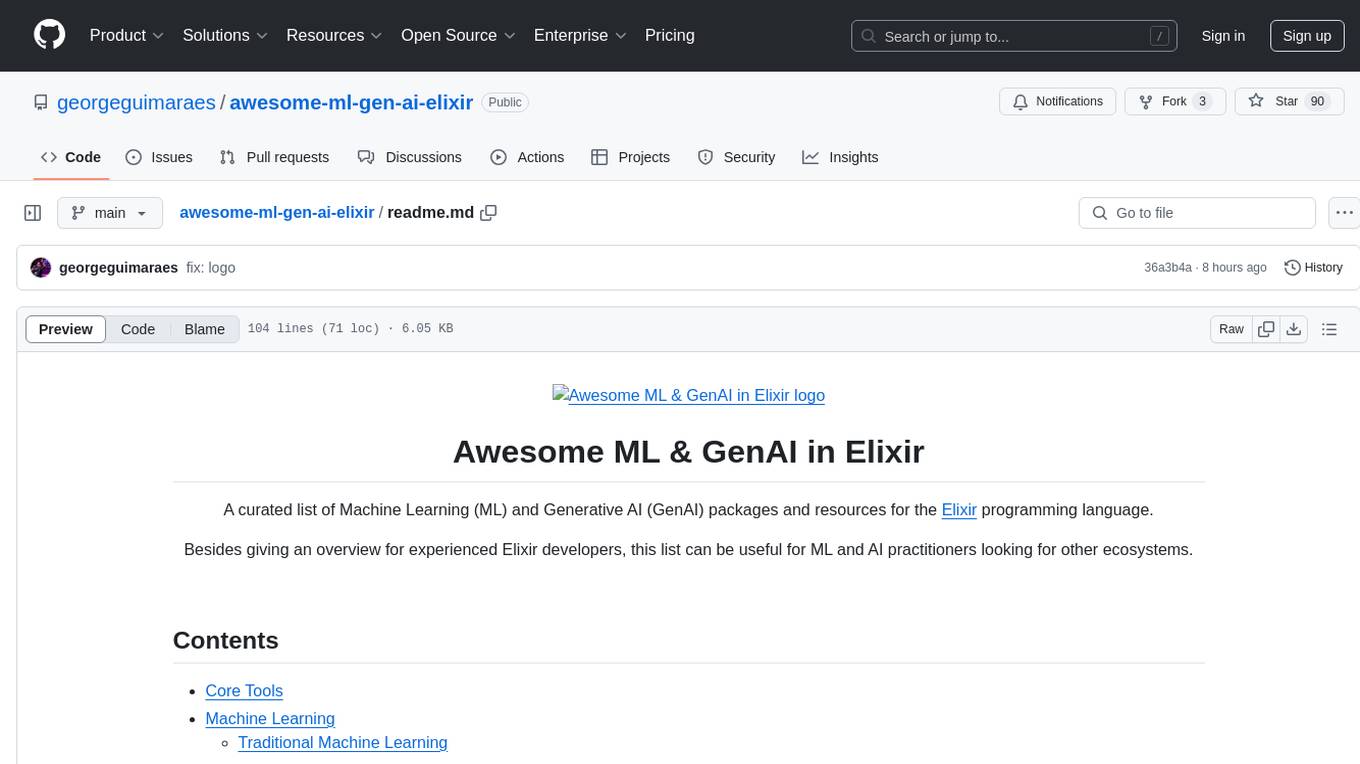
awesome-ml-gen-ai-elixir
A curated list of Machine Learning (ML) and Generative AI (GenAI) packages and resources for the Elixir programming language. It includes core tools for data exploration, traditional machine learning algorithms, deep learning models, computer vision libraries, generative AI tools, livebooks for interactive notebooks, and various resources such as books, videos, and articles. The repository aims to provide a comprehensive overview for experienced Elixir developers and ML/AI practitioners exploring different ecosystems.
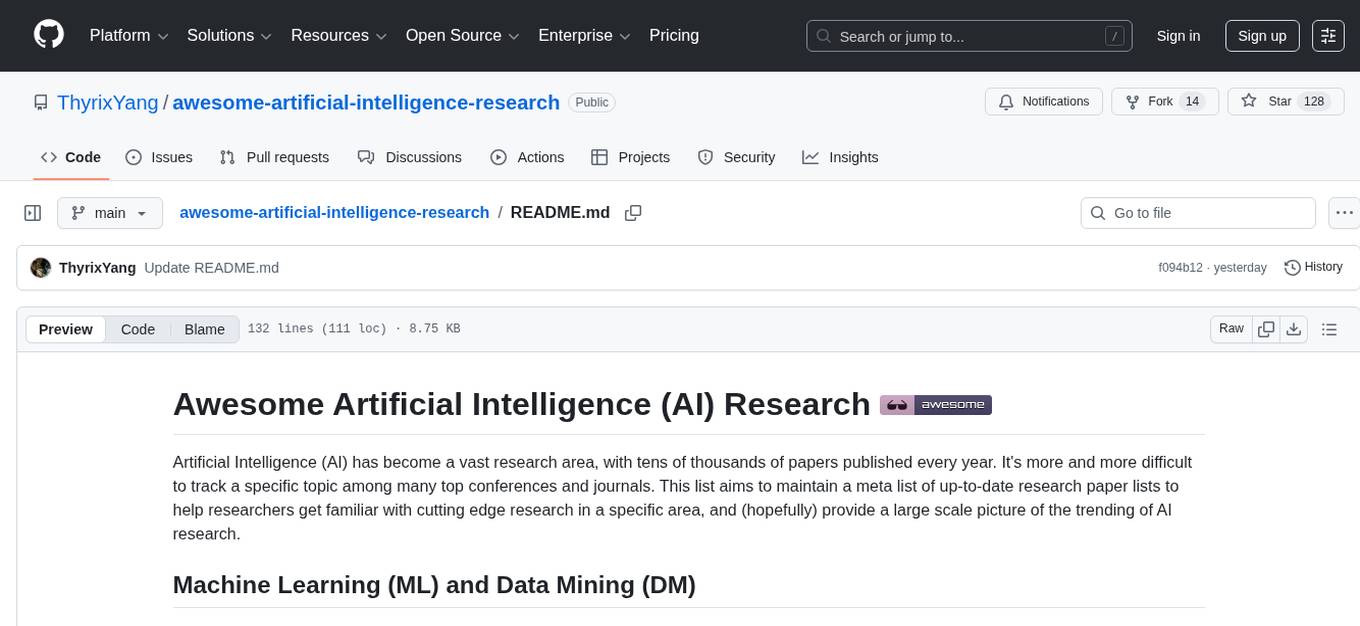
awesome-artificial-intelligence-research
The 'Awesome Artificial Intelligence Research' repository is a curated list of up-to-date research papers in the field of Artificial Intelligence (AI). It aims to help researchers stay informed about cutting-edge research trends and topics in AI by providing a comprehensive collection of research paper lists. The repository covers various subfields of AI, including Machine Learning, Data Mining, Computer Vision, Natural Language Processing, Audio & Speech, and other applications. It also includes tools for research such as public datasets and new paper recommendations.
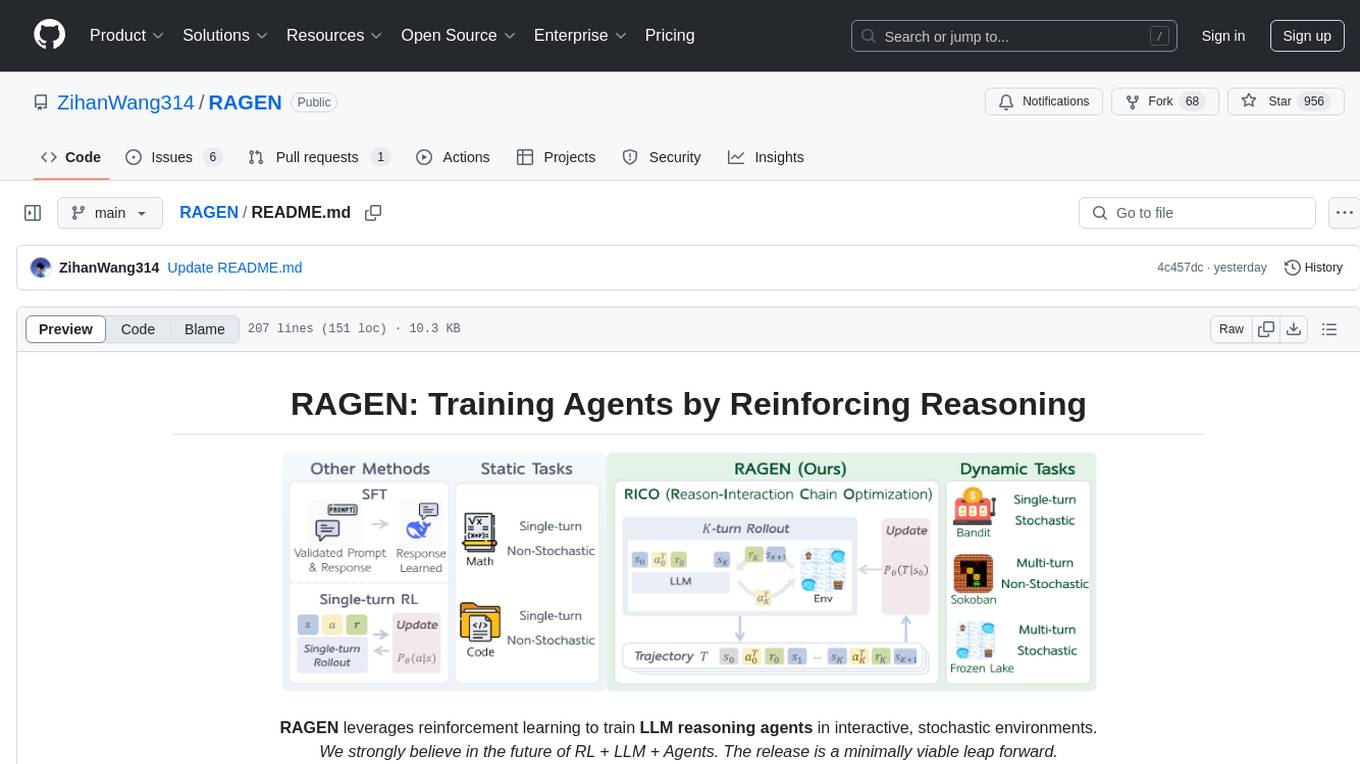
RAGEN
RAGEN is a reinforcement learning framework designed to train reasoning-capable large language model (LLM) agents in interactive, stochastic environments. It addresses challenges such as multi-turn interactions and stochastic environments through a Markov Decision Process (MDP) formulation, Reason-Interaction Chain Optimization (RICO) algorithm, and progressive reward normalization strategies. The framework enables LLMs to reason and interact with the environment, optimizing entire trajectories for long-horizon reasoning while maintaining computational efficiency.
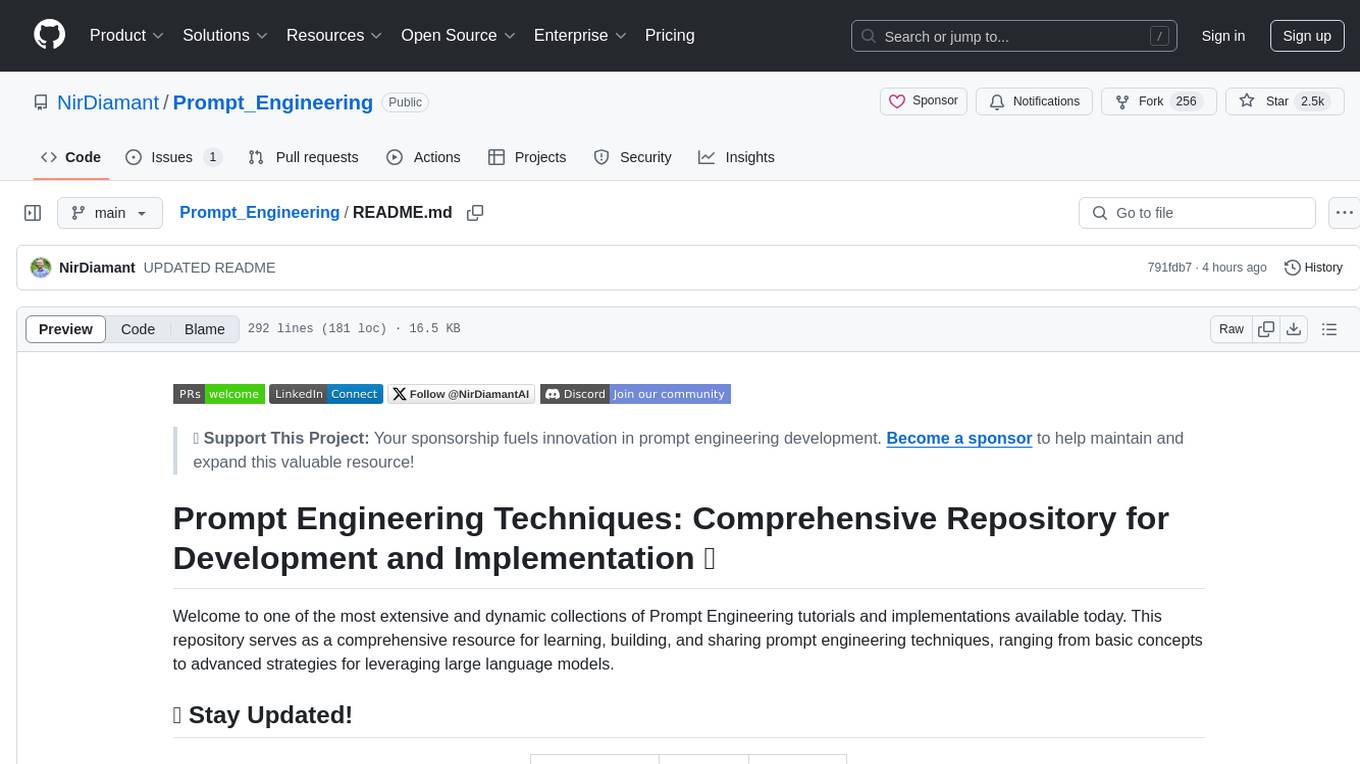
Prompt_Engineering
Prompt Engineering Techniques is a comprehensive repository for learning, building, and sharing prompt engineering techniques, from basic concepts to advanced strategies for leveraging large language models. It provides step-by-step tutorials, practical implementations, and a platform for showcasing innovative prompt engineering techniques. The repository covers fundamental concepts, core techniques, advanced strategies, optimization and refinement, specialized applications, and advanced applications in prompt engineering.
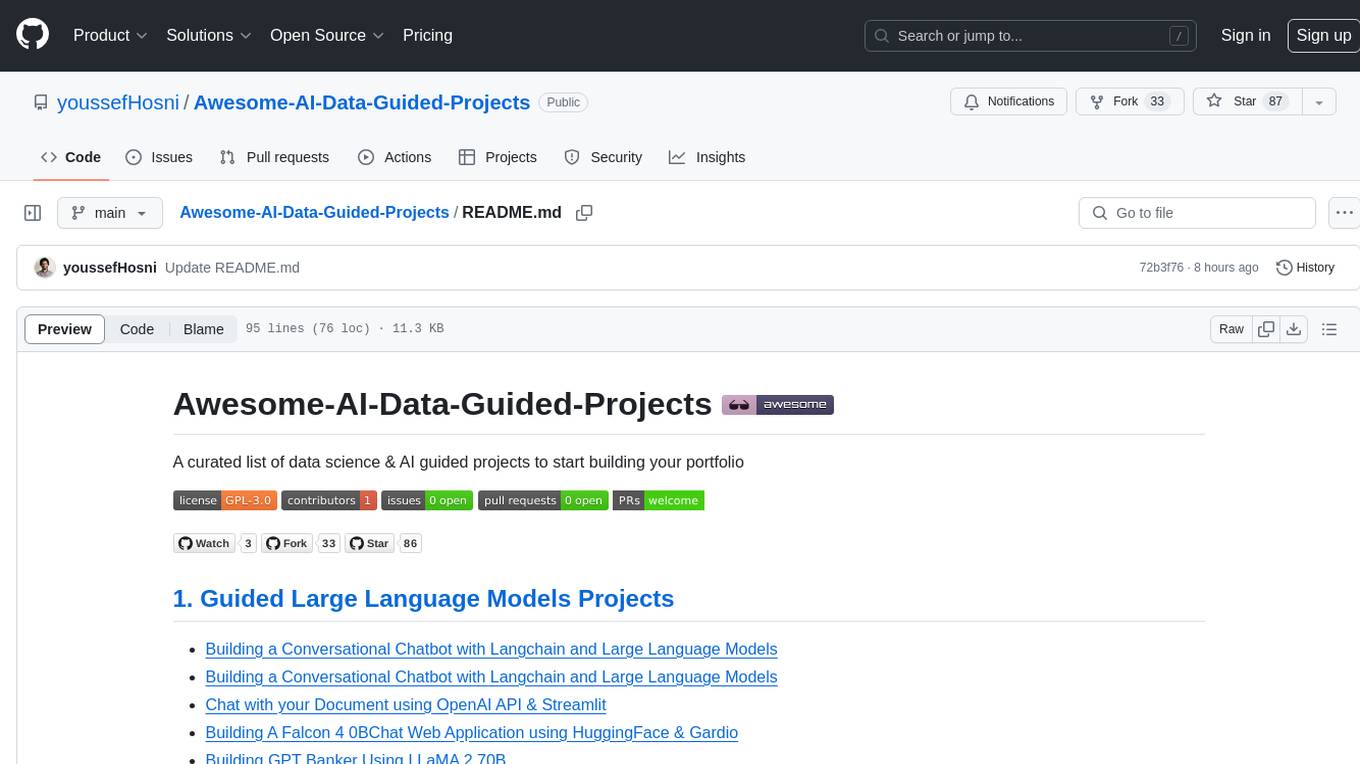
Awesome-AI-Data-Guided-Projects
A curated list of data science & AI guided projects to start building your portfolio. The repository contains guided projects covering various topics such as large language models, time series analysis, computer vision, natural language processing (NLP), and data science. Each project provides detailed instructions on how to implement specific tasks using different tools and technologies.
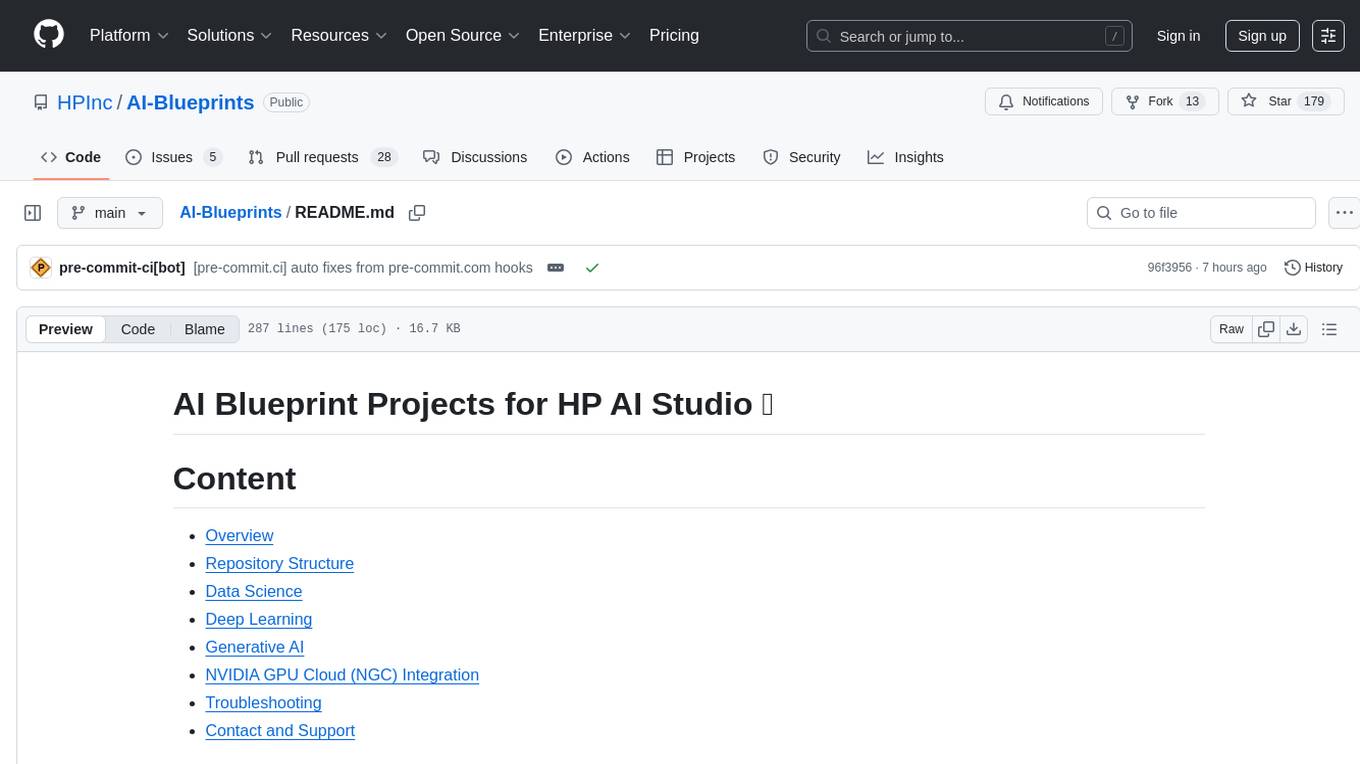
AI-Blueprints
This repository hosts a collection of AI blueprint projects for HP AI Studio, providing end-to-end solutions across key AI domains like data science, machine learning, deep learning, and generative AI. The projects are designed to be plug-and-play, utilizing open-source and hosted models to offer ready-to-use solutions. The repository structure includes projects related to classical machine learning, deep learning applications, generative AI, NGC integration, and troubleshooting guidelines for common issues. Each project is accompanied by detailed descriptions and use cases, showcasing the versatility and applicability of AI technologies in various domains.
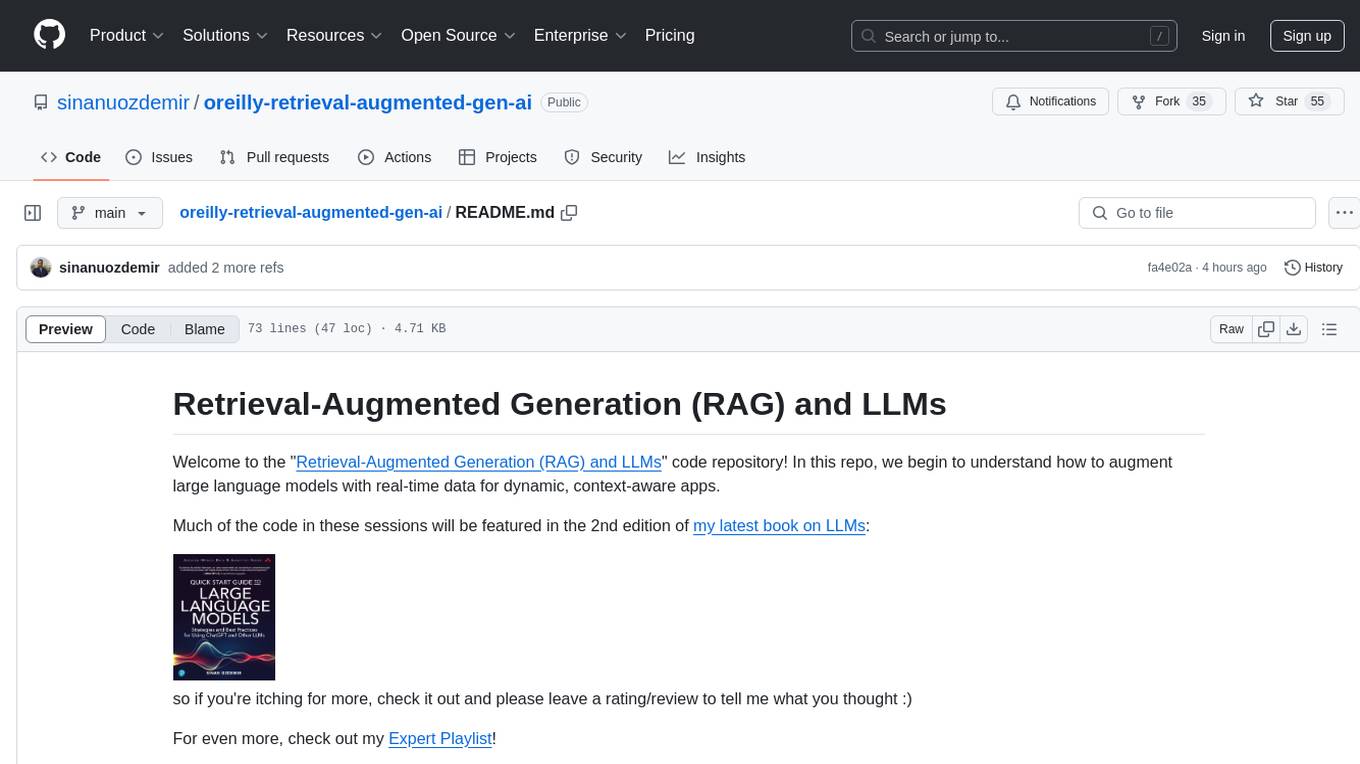
oreilly-retrieval-augmented-gen-ai
This repository focuses on Retrieval-Augmented Generation (RAG) and Large Language Models (LLMs). It provides code and resources to augment LLMs with real-time data for dynamic, context-aware applications. The content covers topics such as semantic search, fine-tuning embeddings, building RAG chatbots, evaluating LLMs, and using knowledge graphs in RAG. Prerequisites include Python skills, knowledge of machine learning and LLMs, and introductory experience with NLP and AI models.
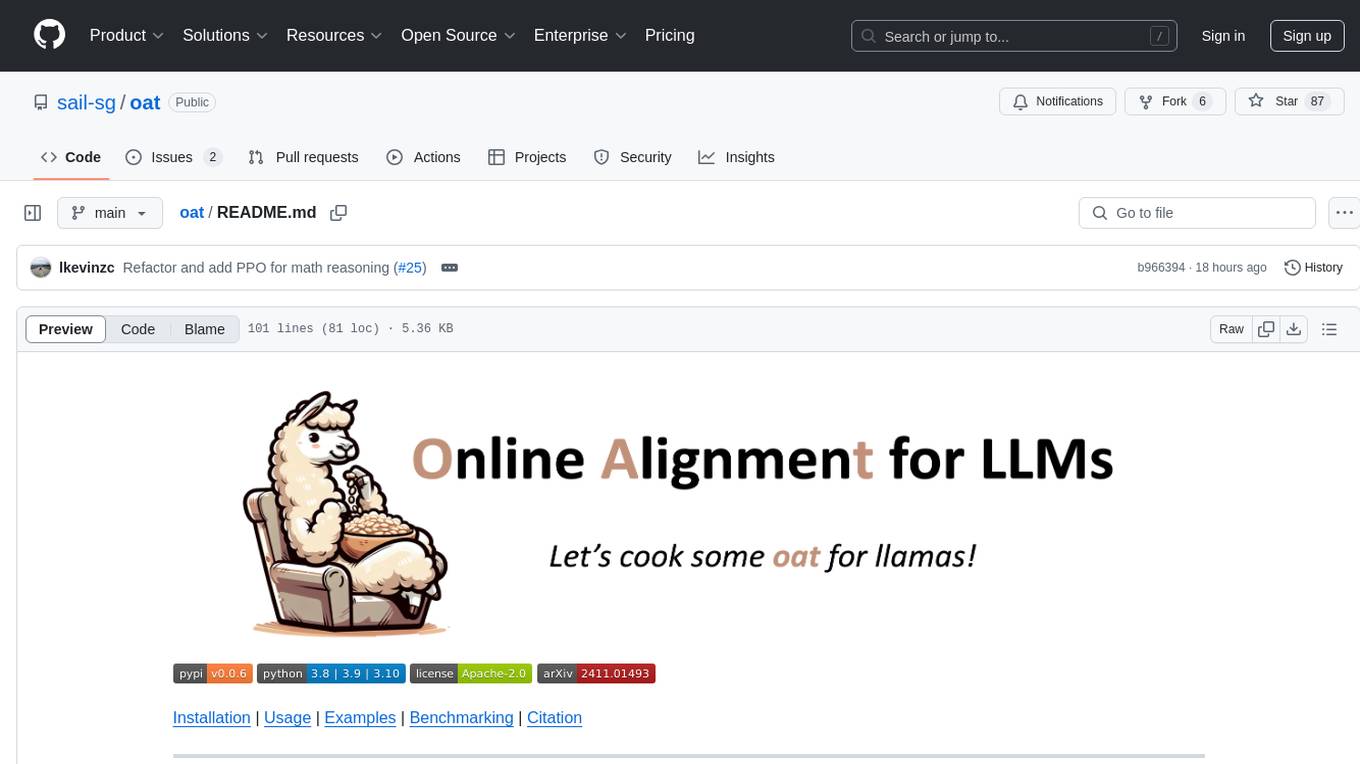
oat
Oat is a simple and efficient framework for running online LLM alignment algorithms. It implements a distributed Actor-Learner-Oracle architecture, with components optimized using state-of-the-art tools. Oat simplifies the experimental pipeline of LLM alignment by serving an Oracle online for preference data labeling and model evaluation. It provides a variety of oracles for simulating feedback and supports verifiable rewards. Oat's modular structure allows for easy inheritance and modification of classes, enabling rapid prototyping and experimentation with new algorithms. The framework implements cutting-edge online algorithms like PPO for math reasoning and various online exploration algorithms.
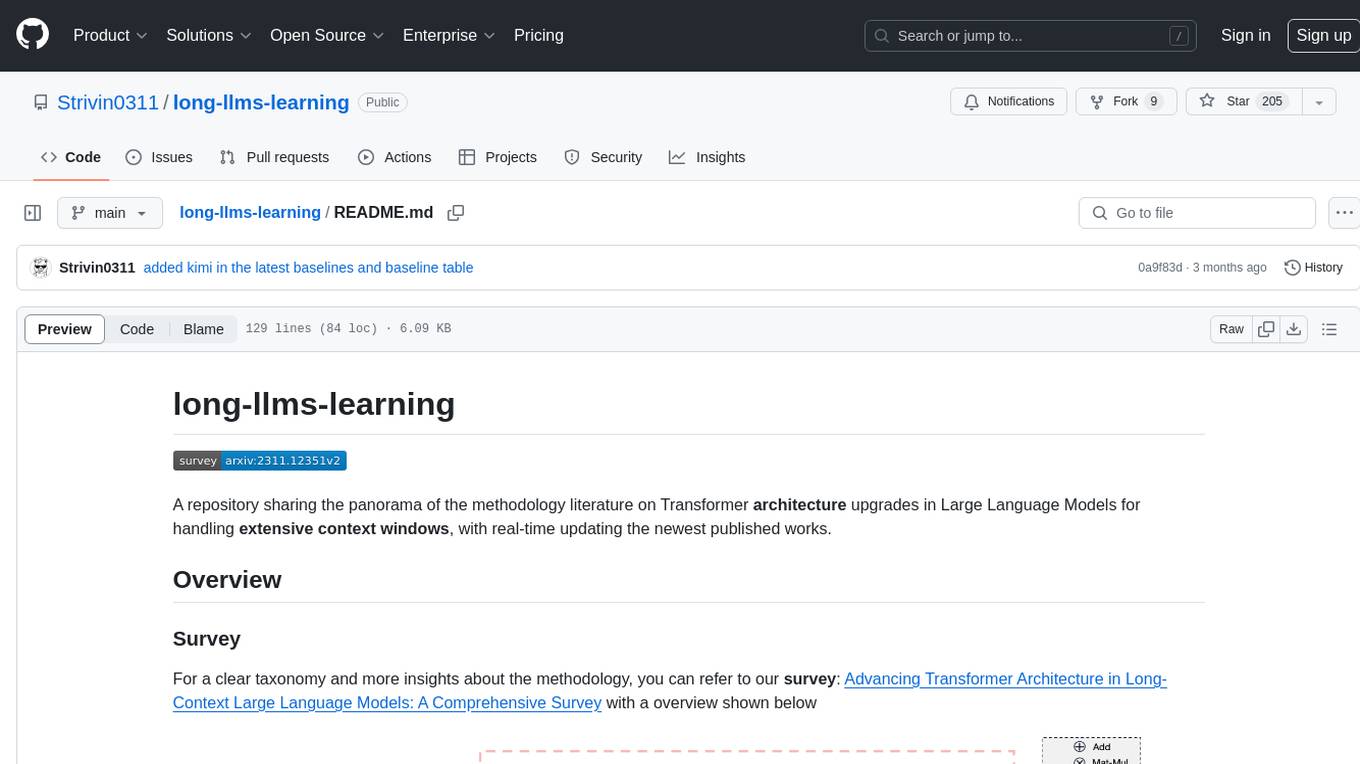
long-llms-learning
A repository sharing the panorama of the methodology literature on Transformer architecture upgrades in Large Language Models for handling extensive context windows, with real-time updating the newest published works. It includes a survey on advancing Transformer architecture in long-context large language models, flash-ReRoPE implementation, latest news on data engineering, lightning attention, Kimi AI assistant, chatglm-6b-128k, gpt-4-turbo-preview, benchmarks like InfiniteBench and LongBench, long-LLMs-evals for evaluating methods for enhancing long-context capabilities, and LLMs-learning for learning technologies and applicated tasks about Large Language Models.
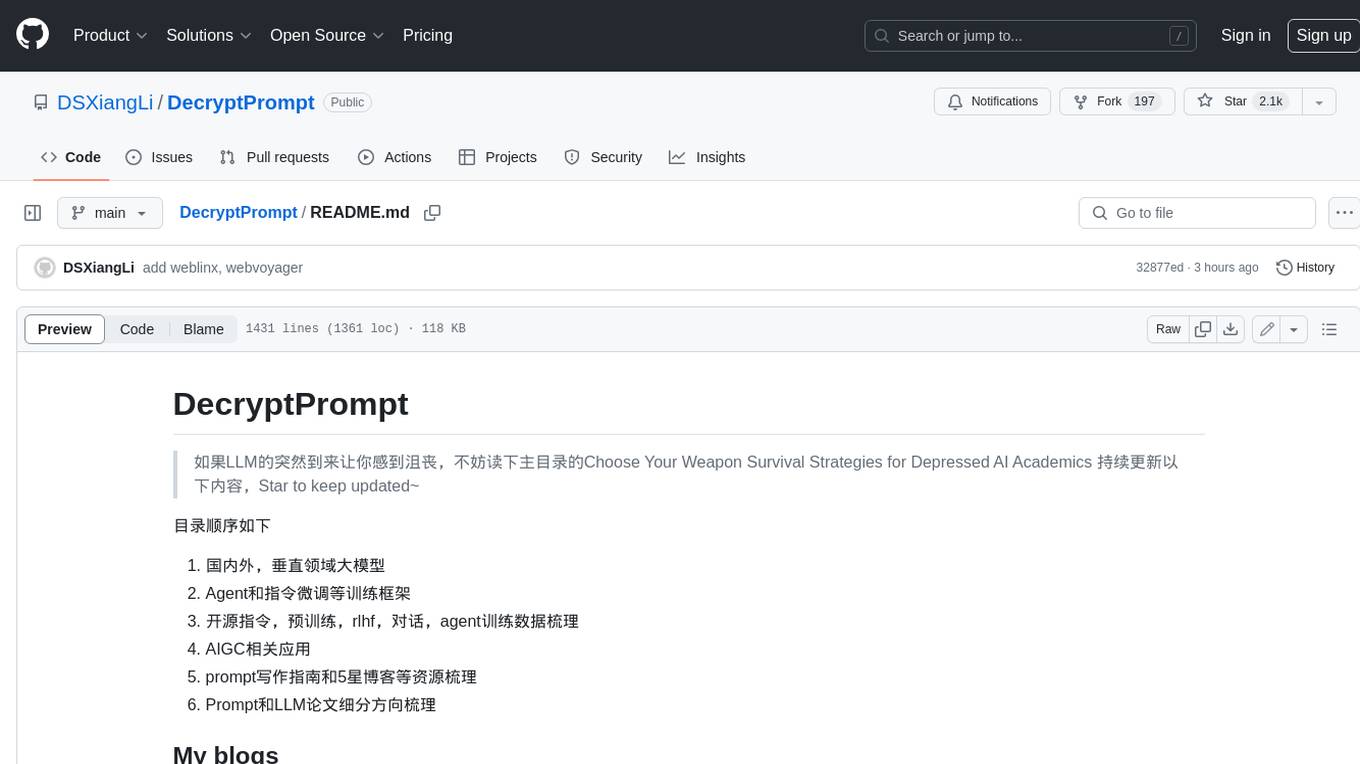
DecryptPrompt
This repository does not provide a tool, but rather a collection of resources and strategies for academics in the field of artificial intelligence who are feeling depressed or overwhelmed by the rapid advancements in the field. The resources include articles, blog posts, and other materials that offer advice on how to cope with the challenges of working in a fast-paced and competitive environment.
For similar tasks

Azure-Analytics-and-AI-Engagement
The Azure-Analytics-and-AI-Engagement repository provides packaged Industry Scenario DREAM Demos with ARM templates (Containing a demo web application, Power BI reports, Synapse resources, AML Notebooks etc.) that can be deployed in a customer’s subscription using the CAPE tool within a matter of few hours. Partners can also deploy DREAM Demos in their own subscriptions using DPoC.

sorrentum
Sorrentum is an open-source project that aims to combine open-source development, startups, and brilliant students to build machine learning, AI, and Web3 / DeFi protocols geared towards finance and economics. The project provides opportunities for internships, research assistantships, and development grants, as well as the chance to work on cutting-edge problems, learn about startups, write academic papers, and get internships and full-time positions at companies working on Sorrentum applications.

tidb
TiDB is an open-source distributed SQL database that supports Hybrid Transactional and Analytical Processing (HTAP) workloads. It is MySQL compatible and features horizontal scalability, strong consistency, and high availability.

zep-python
Zep is an open-source platform for building and deploying large language model (LLM) applications. It provides a suite of tools and services that make it easy to integrate LLMs into your applications, including chat history memory, embedding, vector search, and data enrichment. Zep is designed to be scalable, reliable, and easy to use, making it a great choice for developers who want to build LLM-powered applications quickly and easily.

telemetry-airflow
This repository codifies the Airflow cluster that is deployed at workflow.telemetry.mozilla.org (behind SSO) and commonly referred to as "WTMO" or simply "Airflow". Some links relevant to users and developers of WTMO: * The `dags` directory in this repository contains some custom DAG definitions * Many of the DAGs registered with WTMO don't live in this repository, but are instead generated from ETL task definitions in bigquery-etl * The Data SRE team maintains a WTMO Developer Guide (behind SSO)

mojo
Mojo is a new programming language that bridges the gap between research and production by combining Python syntax and ecosystem with systems programming and metaprogramming features. Mojo is still young, but it is designed to become a superset of Python over time.

pandas-ai
PandasAI is a Python library that makes it easy to ask questions to your data in natural language. It helps you to explore, clean, and analyze your data using generative AI.

databend
Databend is an open-source cloud data warehouse that serves as a cost-effective alternative to Snowflake. With its focus on fast query execution and data ingestion, it's designed for complex analysis of the world's largest datasets.
For similar jobs

spear
SPEAR (Simulator for Photorealistic Embodied AI Research) is a powerful tool for training embodied agents. It features 300 unique virtual indoor environments with 2,566 unique rooms and 17,234 unique objects that can be manipulated individually. Each environment is designed by a professional artist and features detailed geometry, photorealistic materials, and a unique floor plan and object layout. SPEAR is implemented as Unreal Engine assets and provides an OpenAI Gym interface for interacting with the environments via Python.

openvino
OpenVINO™ is an open-source toolkit for optimizing and deploying AI inference. It provides a common API to deliver inference solutions on various platforms, including CPU, GPU, NPU, and heterogeneous devices. OpenVINO™ supports pre-trained models from Open Model Zoo and popular frameworks like TensorFlow, PyTorch, and ONNX. Key components of OpenVINO™ include the OpenVINO™ Runtime, plugins for different hardware devices, frontends for reading models from native framework formats, and the OpenVINO Model Converter (OVC) for adjusting models for optimal execution on target devices.
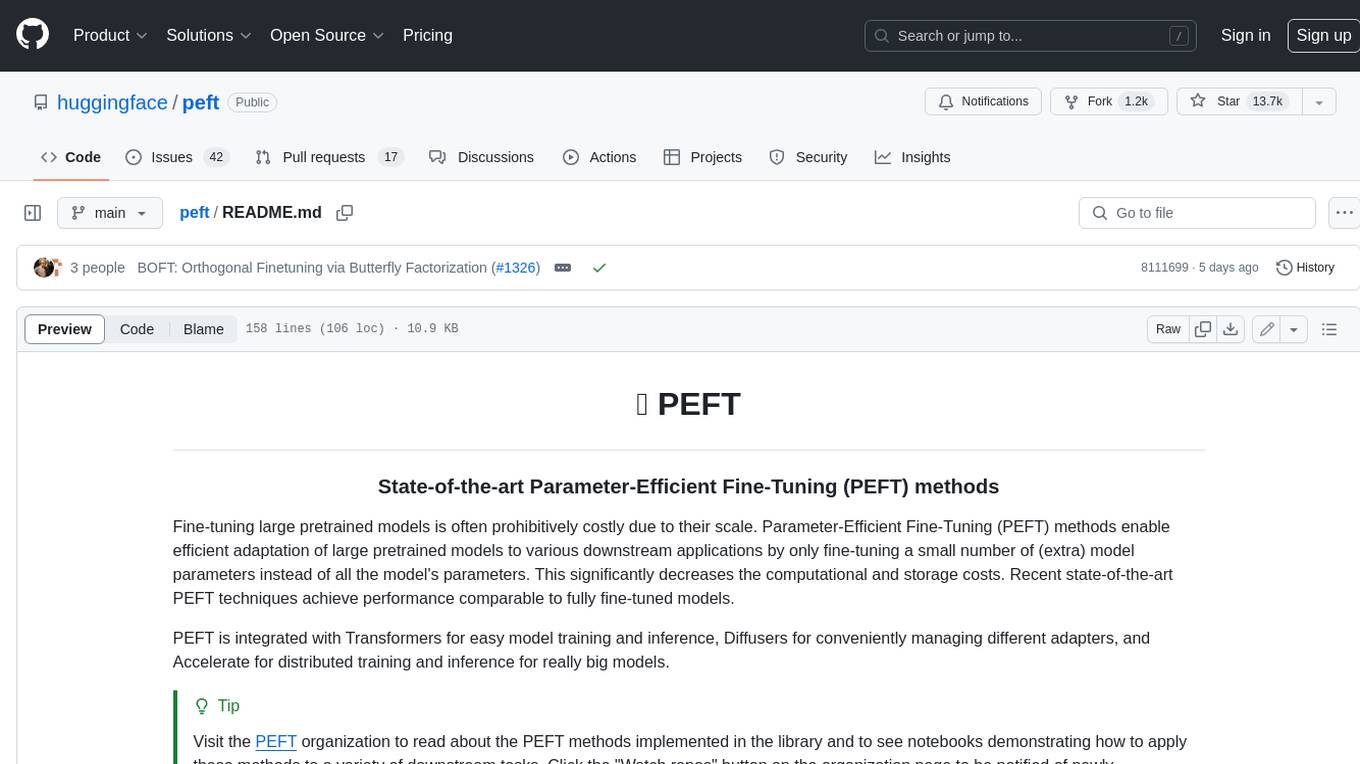
peft
PEFT (Parameter-Efficient Fine-Tuning) is a collection of state-of-the-art methods that enable efficient adaptation of large pretrained models to various downstream applications. By only fine-tuning a small number of extra model parameters instead of all the model's parameters, PEFT significantly decreases the computational and storage costs while achieving performance comparable to fully fine-tuned models.
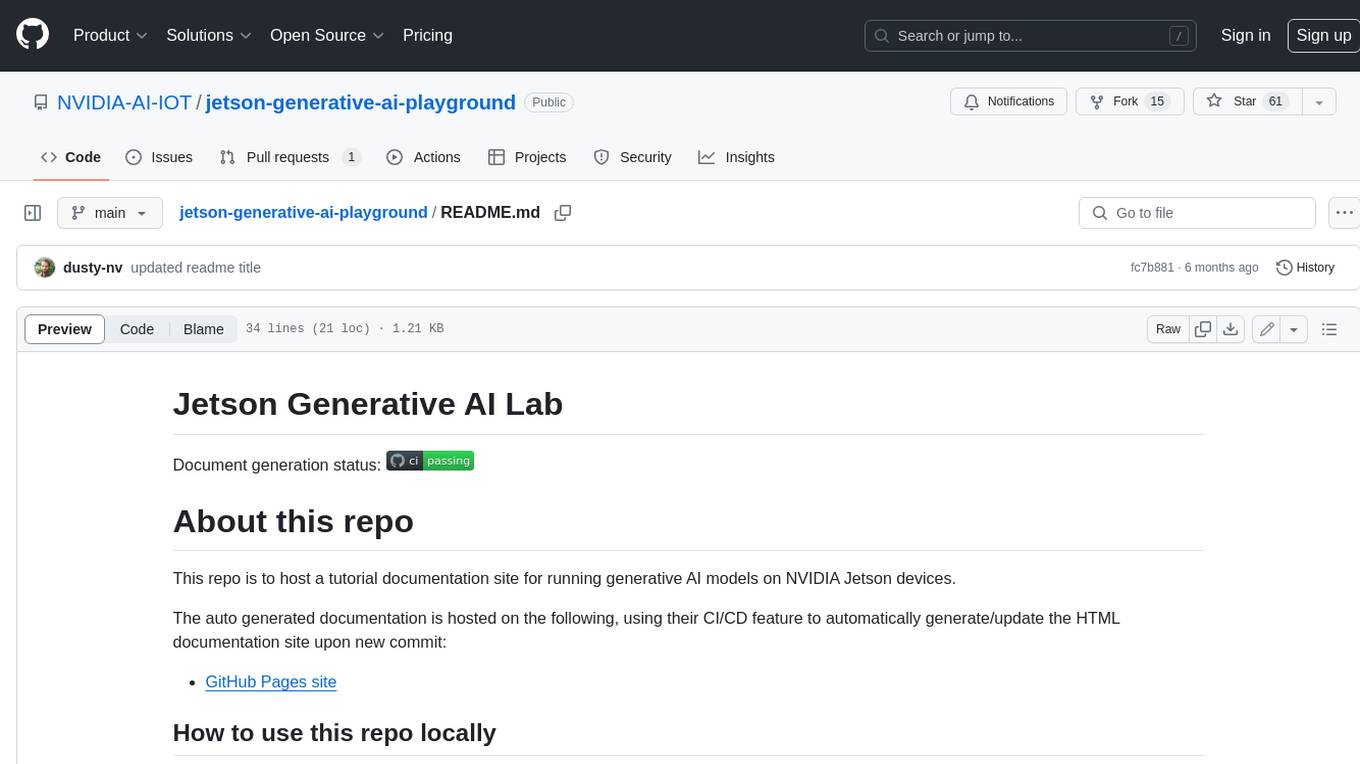
jetson-generative-ai-playground
This repo hosts tutorial documentation for running generative AI models on NVIDIA Jetson devices. The documentation is auto-generated and hosted on GitHub Pages using their CI/CD feature to automatically generate/update the HTML documentation site upon new commits.
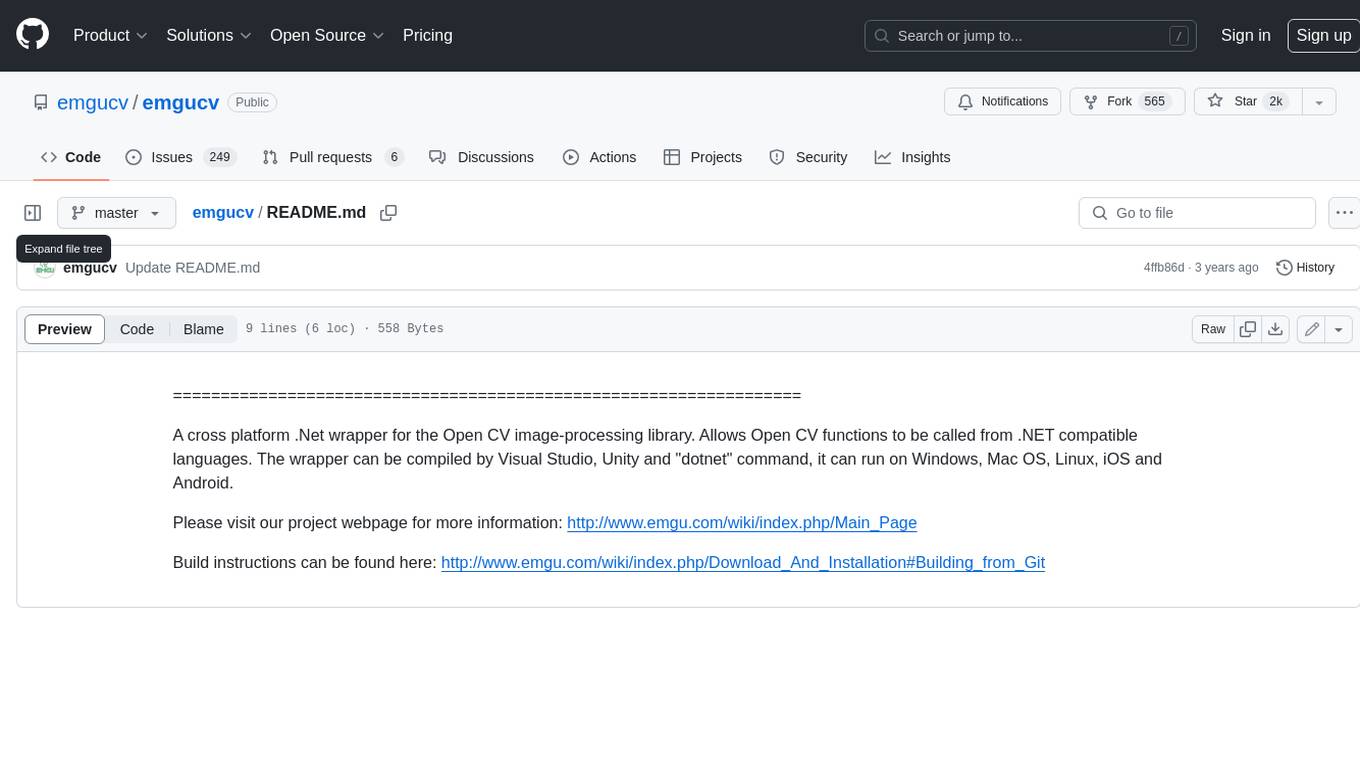
emgucv
Emgu CV is a cross-platform .Net wrapper for the OpenCV image-processing library. It allows OpenCV functions to be called from .NET compatible languages. The wrapper can be compiled by Visual Studio, Unity, and "dotnet" command, and it can run on Windows, Mac OS, Linux, iOS, and Android.
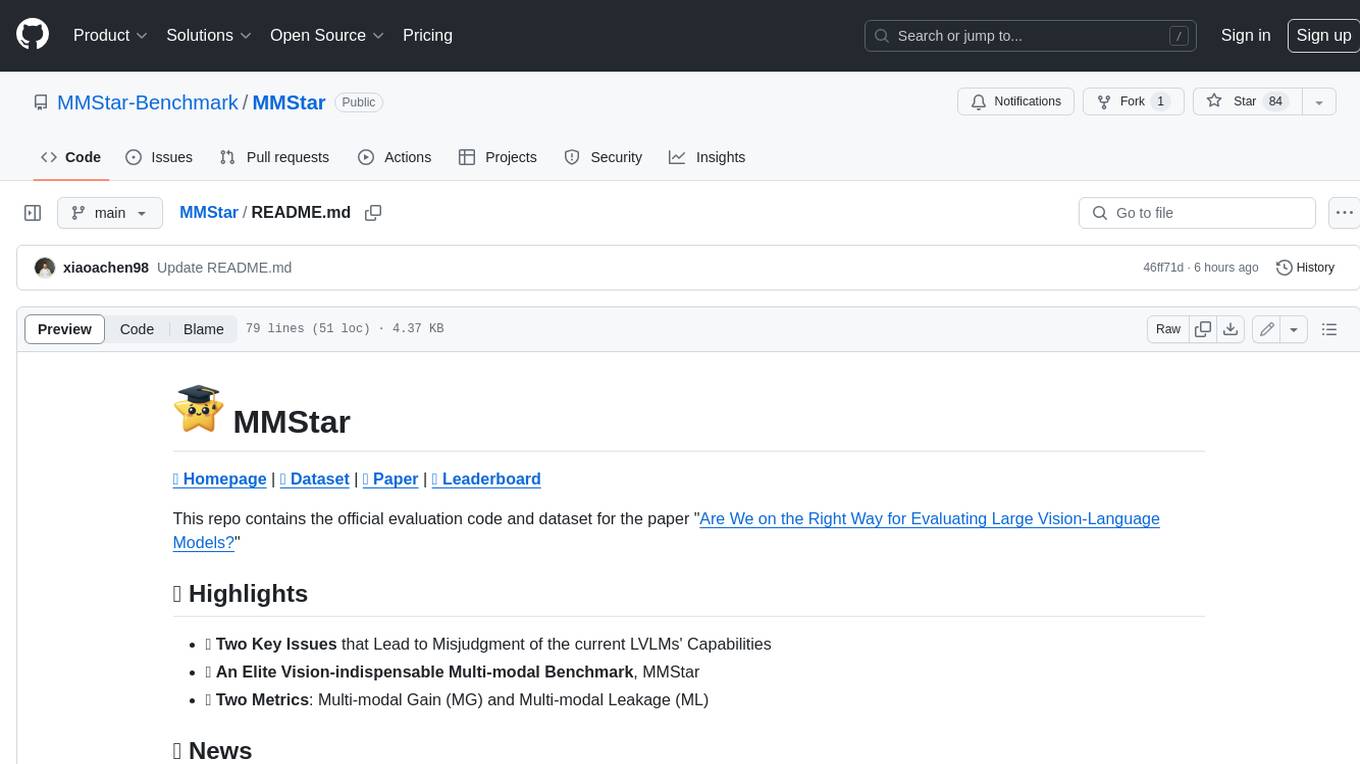
MMStar
MMStar is an elite vision-indispensable multi-modal benchmark comprising 1,500 challenge samples meticulously selected by humans. It addresses two key issues in current LLM evaluation: the unnecessary use of visual content in many samples and the existence of unintentional data leakage in LLM and LVLM training. MMStar evaluates 6 core capabilities across 18 detailed axes, ensuring a balanced distribution of samples across all dimensions.
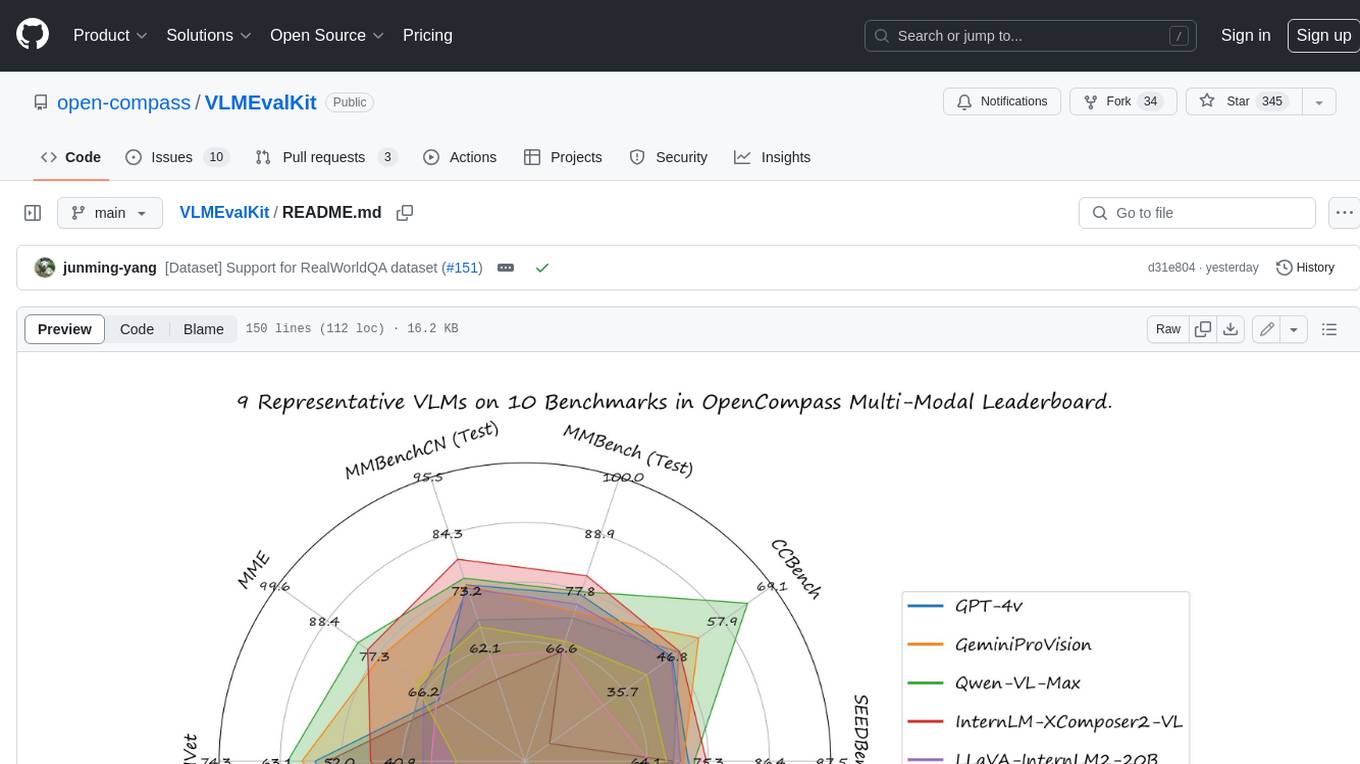
VLMEvalKit
VLMEvalKit is an open-source evaluation toolkit of large vision-language models (LVLMs). It enables one-command evaluation of LVLMs on various benchmarks, without the heavy workload of data preparation under multiple repositories. In VLMEvalKit, we adopt generation-based evaluation for all LVLMs, and provide the evaluation results obtained with both exact matching and LLM-based answer extraction.

llava-docker
This Docker image for LLaVA (Large Language and Vision Assistant) provides a convenient way to run LLaVA locally or on RunPod. LLaVA is a powerful AI tool that combines natural language processing and computer vision capabilities. With this Docker image, you can easily access LLaVA's functionalities for various tasks, including image captioning, visual question answering, text summarization, and more. The image comes pre-installed with LLaVA v1.2.0, Torch 2.1.2, xformers 0.0.23.post1, and other necessary dependencies. You can customize the model used by setting the MODEL environment variable. The image also includes a Jupyter Lab environment for interactive development and exploration. Overall, this Docker image offers a comprehensive and user-friendly platform for leveraging LLaVA's capabilities.